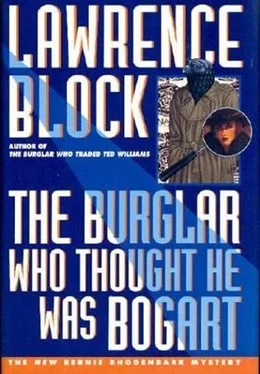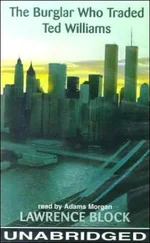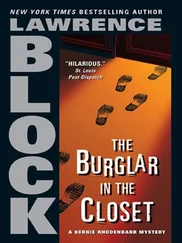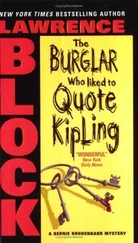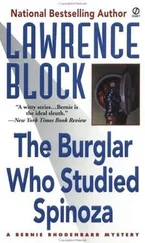“I want to thank you all for coming,” I said. “I know you’re all busy people, and I don’t want to take up too much of your time. So I’ll get right to it.”
I would have, too, but some clown picked that moment to stick his head in the door. “The sign says you’re closed,” he said, sounding peeved.
“We are,” I said. “There’s a private sale going on. We’ll be keeping our usual hours tomorrow.”
“But you got a table outside,” he said, “plus your door’s not locked.”
“I’ll fix that,” I said, and closed it in his face, and thumbed the catch to lock it. He gave me a look and turned away, and I turned back to my guests.
“Sorry,” I said. “Mowgli, if anybody else tries to come in-”
“I’ll take care of it,” he said.
“Thanks. Where was I?”
“You were getting right to it,” Charlie Weeks said.
“So I was,” I said, and found a bookcase to lean against. “I want to tell you a story, and I may have to jump around a little, because this story starts in a few different places at a few different times. It has its roots deep in the nineteenth century, when nationalist sentiments began to stir throughout the lands administered by the Austro-Hungarian and the Ottoman empires. One of those Balkan nationalisms precipitated the outbreak of the First World War, when a young Serb shot the Austrian archduke. By the time that war ended, self-determination of nations was a catchphrase throughout the western world. Independence movements flowered across Europe. Among the presumptive nations to declare their independence was the sovereign nation of Anatruria. It was designated as a kingdom, and its monarch was to be King Vlados the First.”
This couldn’t have been news to any of them, except for Ray and Mowgli, and possibly Wilfred. But they all paid close attention.
“The Anatrurians did what they could to add substance to their proclamation of sovereignty,” I went on. “An extensive series of stamps was printed at Budapest, and some were actually used postally within the borders of Anatruria. Some pattern coins were struck and distributed to friends of the new nation, although a general issue was never produced for circulation. There were a few medals issued as well, bearing the new king’s likeness and presented to some men who had been the mainstay of the independence movement.”
“Scarce as hen’s teeth, all of them,” Tsarnoff declared. “And about as eagerly sought in the collector market.”
“Anatrurian hopes were dashed at Versailles,” I went on, “when Wilson and Clemenceau remade the map of Europe. What would have been Anatruria was parceled up among Romania, Bulgaria, and Yugoslavia. King Vlados and Queen Liliana lived out the remainder of their lives in exile, still serving as a rallying point for those who continued to believe in the Anatrurian cause. But the movement died down.”
“The flame flickered,” Ilona murmured. “But it was never extinguished.”
“Maybe not,” I said, “but there was a time when it would have taken it a long time to bring a kettle to the boil. Then, during World War Two, the Anatrurian partisans had an active role.”
“They were opportunists,” Tsarnoff put in, “switching allegiance as it served their interests. One day they’d be fighting side by side with Ante Pavelic’s Croatian Ustachi, murdering Serbs, and the next thing you knew they’d be on the Serbian side, sacking Croat villages. Were they for Hitler or against him? It depended when you asked the question.”
“They were for Anatruria,” Ilona said. “Every day, every week, every month of the year.”
“They were for themselves,” Tiglath Rasmoulian said. “As who is not?”
“When the war ended,” I went on, “national borders in that part of the world remained essentially unchanged, but governments were in upheaval. The Soviet Union’s span of influence quickly took in all of Eastern Europe, and Truman had to draw a line in the sand to keep Greece and Turkey this side of the Iron Curtain. Several American intelligence agencies, at least one of them an outgrowth of the wartime OSS, sought to even the balance in that strategically vital area of the world.” I frowned, annoyed at the tone I was taking. In spite of all the films I’d seen lately, I was managing to sound like an Edward R. Murrow voice-over for a documentary.
“Among the clandestine missions dispatched to the region”-damn, I was still doing it-“was a group of five American agents.”
I hesitated for an instant, and Charlie Weeks read my mind. “Oh, they were all Americans, all right. Hundred percent red-blooded nephews of their Uncle Sam. No wretched refuse of your teeming shores in the Bob and Charlie Show, not on your life.”
“Five Americans,” I said quickly. “Robert Bateman and Robert Rennick. Charles Hoberman and Charles Wood. And Charles Weeks.”
“Charles Weeks?” Ray said. “This fellow here?”
“This fellow here,” said Charlie Weeks.
I told how, for convenience sake, the Roberts had become Bob and Rob respectively, the Charleses Cappy, Chuck, and Charlie. “And,” I said, “they all had animal names.”
Mowgli said, “Animal names? I’m sorry, Bernie, I didn’t mean to interrupt, but I want to make sure I heard you right.”
“Animal names,” I said. “You heard me right. Code names, really. Bateman was the cat and Rennick was the rabbit.”
“Actually,” Weeks put in, “it was the other way around. Not that it matters much, at this late date.”
“I stand corrected. Cap Hoberman was the ram. Charlie Weeks was the mouse.”
“Squeak squeak,” said Charlie Weeks.
“And Chuck Wood’s totem, perhaps inevitably, was the woodchuck. His was the only one which was a play on words rather than a reference to some perceived personal characteristic, and I mention that because it’s relevant. I’m guessing now, but I’d say that Wood selected the name for himself.”
“Ha!” said Weeks. He looked up and to the left, reaching for the memory. “You know,” he said, “I think you’re right, weasel.”
Carolyn said, “Weasel?”
I let it pass. “Five Americans,” I said, “each with an animal for a code name, undercover in the Balkans. Working together and with partisans and dissidents of every description, all with the aim of destabilizing… Yugoslavia? Romania? Bulgaria?”
“Any one would do,” Weeks said dreamily. “Or all three. Be nice, wouldn’t it? Real feather in the collective cap for Hannibal ’s Animals.” He winked at me. “Another name we had for ourselves. I didn’t tell you about that one, did I? After the old man in Adams-Morgan who was running us. His code name was Hannibal, don’t ask me why, and the name we made up for him was the elephant.” He put his fingertips together. “But don’t get me started, weasel. It’s your party, yours to tell the tale.”
I said, “One possible lever they found was the movement for Anatrurian independence. Causes don’t die out in that part of the world, they just go dormant for a generation or two. King Vlados was well up in his seventies, a widower living on the Costa de Nada with a succession of housekeepers, his social life the same endless round of drinks and cardplaying with other once-crowned heads that had been sustaining him for the past forty years. He was a valuable symbol of Anatrurian greatness, but you couldn’t expect him to march in the van of a renewed patriotic movement. The last thing he was going to do was give up the Spanish sun for some back-room rallies in the Anatrurian hills.”
“Mountains,” Ilona said.
“But Vlados and Liliana had a son. L’aiglon, the French would say. The eaglet, the crown prince, the heir apparent.”
Читать дальше
